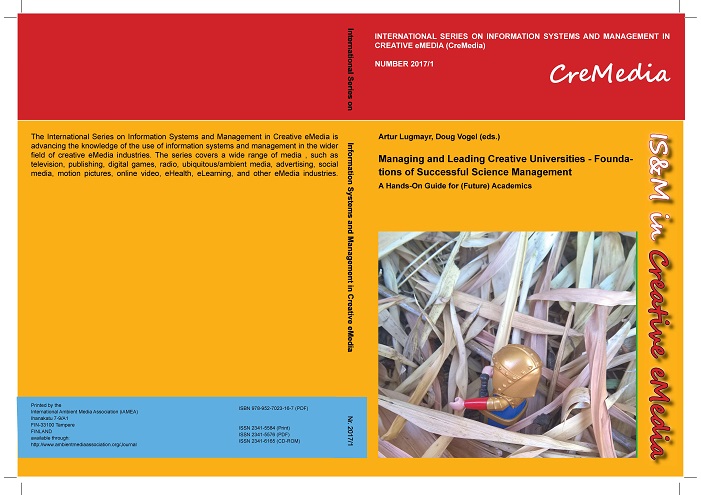Managing and Leading Creative Universities – Foundations of Successful Science Management, iAMEA, 2017
Artur Lugmayr and Doug Vogel (Eds.)
Leadership and management and leading universities, faculties, departments, or research laboratories undergoes a tremendous change during recent years. Universities and its researchers are more and more under pressure to produce scientific results and commercial viable outputs. Academic freedom and science as long-term investment for society and business vanish more and more, and put pressure on scientists to rise funding, cope with external stakeholders or job uncertainties, and internationalization strategies. The scope of this book is to discuss the changes, and especially emphasize the importance of universities as grassroots place for many activities.
- Book Website: http://unimgm.artur-lugmayr.com
- Email List: http://www.ambientmediaassociation.org/tiki/article4-List-of-EMail-Lists-and-Newsletters-Hosted-by-iAMEA
- Facebook Group: https://www.facebook.com/groups/universitymanagement/
- Contact us: lartur@acm.org
Leadership and management and leading universities, faculties, departments, or research laboratories undergoes a tremendous change during recent years. Universities and its researchers are more and more under pressure to produce scientific results and commercial viable outputs. Academic freedom and science as long-term investment for society and business vanish more and more, and put pressure on scientists to rise funding, cope with external stakeholders or job uncertainties, and internationalization strategies. The scope of this book is to discuss the changes, and especially emphasize the importance of universities as grassroots place for many activities. The book focuses on concepts, frameworks, and theories to derive policy guidelines for people involved in university management. For scientists the book assists in developing their careers and gain insights in university management. The book especially focuses on how to lead creative universities, and shall shade light on successful criteria for successful science management.
Manuscript Preparation
- VERY IMPORTANT NOTE!!! Please upload your final submission as complete .ZIP file, which indcludes: 1) original book file (in e.g. word or latex), 2) pdf version of your final book chapter, 3) short bio of all the authors (in word format), and 4) picture of each author
- please follow the manuscript formatting guidelines below, and only submit the original version (in Microsoft word) with the submission system
- each final manuscript should be approx. 17 pages long (depending on the number of submissions and final page count longer manuscripts might also be accepted)
- Each chapter shall include a 1-2 pages section where practical conclusions shall be drawn from the theoretical aspects presented in the chapter that shall help future university leaders & managers
- Please prepare your manuscript according the following guidelines: http://www.springer.com/authors/book+authors?SGWID=0-154102-12-417900-0
- Manuscript submission website: http://www.ambientmediaassociation.org/Submissions/2014UNIMGM/
Target Audience
The target audience is rather large for this type of book. The target audience includes those in management positions as well as those aspiring to leadership in universities seeking to be creative in addressing future needs and interests. This would span the globe and has no regional boundaries. The target audience shall also include researchers addressing academic research around university administrative sciences, especial social sciences. For these the book would act as reference work in their teaching curricular. The reader should gain insights into theoretical, practical work, and documentation about experience of which they could then more intelligently choose their own research and scientific path to recognize opportunities as well as deal more efficiently with challenges.
Topics of Interest
University Eco-System in a Larger Context – Between Local Industry, Politics, Inter-University Competition, and in Global Settings
- Potentials of Non-World-Class Universities
- World-Class Universities
- Universities and Local Industry
- Knowledge Transfer: Industry & Local Initiatives
- Regional Innovation & Universities
- Financing of Public and Private Universities
- Quantitative and Qualitative University Rankings
- Industry, Academic, and Government Perspectives
- Universities as Business
- Research Eco-Systems
- Universities in a Global Competition
- Politics and the University
- Methods and Models for Innovation and Commercialization
- Stakeholder Interests and Management
- University Excellence
- Demographic Change and Challenges
- Creation of University Spin-Offs
- Educational Reforms and Transformations
- Society and Economic Impact of Universities
Research Community, Self-Management and Scientific Career
- Emotional Intelligence in University Leadership
- Time Management and Organization of Life
- University Personalities and Group Dynamics
- Self-Marketing and Scientific Career
- Scientific Career Planning
- Organizing Scientific Events – From Workshop to Conferences
- Ethic and Culture Aspects
- Cultural Diversity, Internationality, and Multidisciplinary
- Efficient Networking and Community Building
- Working with Research Associations, and Institutions
- Getting Work Published
- Scientific Publishing and Getting your Work Published
- International Collaboration and Networking
- New Researcher Identities and Personalities
- Quality Assessment and Assurance Processes
Fund Raising, Project Planning, Financing, and Project Administration
- Applying for Funding and Working with Funding Organization
- University Specific Project Management
- Financial Aspects of Research Management
- Applying for Funding and Working with Funding Organization
- Project Management
- The Roadmap towards Fund Raising
- Budget Balancing and Planning
- Salaries, Budget Division, and Rewards
- Performance Measurement
- Management of Research
- Team Motivation and Empowerment
Organization, Administration, and Management of Universities – From Research Project Level to University Leadership
- Research Mission of Universities
- Human Resource Management
- Governing Universities
- Intellectual Capital and IPRs
- Transformation of Universities
- Accounting & Financial Issues
- People management & research climate
- Researcher Development and Creation of Opportunities
- Organizational Structure
- Recruiting Methods
- Marketing and Branding
- Models for Inter-University and Inter-Project Cooperation
- Team level Management and Motivation
- Methods for Management of Laboratories, Departments, Faculties, and Universities
- Evaluation, Benchmarking, and Performance Measurement
- Resource Management
- Virtual & Digital Universities
- Research Quality and Scientific Impact
- Marketing of Scientific Work
- Knowledge Sharing and Analysis
- Ethic and Culture Aspects
- Creation of Vision & Mission
New Technologies Supporting Universities in Education, Management, and Organization
- Development of Teaching Curricula and Study Programs
- IT Systems and Infrastructure
- eLearning Platforms
- University Management Systems
- Budgeting & Administration Infrastructure
- Virtual and Digital Universities
- Distance Education Infrastructures
- Communication Technologies
- Laboratory Equipment and Technologies
Development of Teaching, Education, and Student Activities
- Balance and inter-relationship between teaching, research, and administration
- Student personalities
- Student mentoring and supervision
- Learning and Teaching Portfolio Analysis and Assessment
- Art, Technical, and Business Education at Universities
- Challenging Plagiarism
- Admission testing & Entrance Examinations
- Innovations in Teaching
- Preparing Students for Entrepreneurships
- Integration of Research & Teaching
We strongly welcome other topic suggestions dealing with convergence on a managerial, information system, and consumer level beyond the topics suggested above.
Tentative Structure for Categorizing All Book Chapters
- Introduction
- Research Ecosystem
- The University Environment
- Leadership, Management, and Networking
- Self-Management and Scientific Career
- Developing Teaching and Education
- Fund raising
- Research & Scientific Work
- 50 How-To’s for Future Scientists (collection of key-issues from the previous chapters)
- Conclusions
Schedule and Deadlines
NOTE! The book is build successively also besides these deadlines, and the chapters are selected very carefully. Please contact us also outside the deadlines if you should be interested in contributing!
Additional Book Material
- book website with lecture slides
- online discussion and idea exchange forum for science
- networking possibility for reader
Stay Informed
- Book Website: http://unimgm.artur-lugmayr.com
- Email List: ===http://mail.ambientmediaassociation.org/mailman/listinfo/university-management_ambientmediaassociation.org===
- Facebook Group: https://www.facebook.com/groups/universitymanagement/
- Contact us: lartur@acm.org



